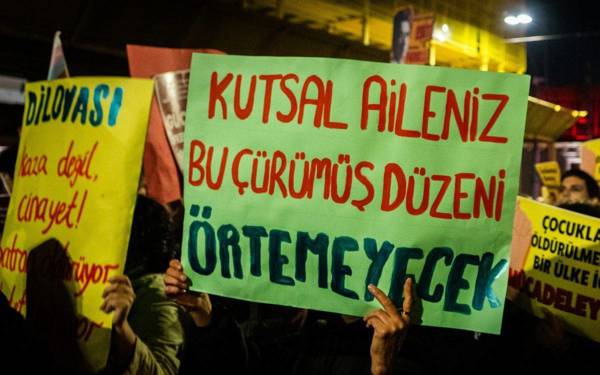* Photo: csgorselarsiv.org/Esra Tokat, Video: Kıvılcım Akay
Click to read the article in Turkish
"Discretionary mitigations, as its name suggests, is where the judge uses the discretionary power and where we most frequently encounter sexist practices. It is also known as the 'good conduct time'.
"It is - of course - good that these sentence reductions that we call 'tie reductions' and protect perpetrators will not be imposed especially based on clothes and attitude at court; however, it needs to be ensured that the sexist viewpoints of judges are changed and they do not base their discretionary power to reduce sentences on sexist or discriminatory grounds. And this can be ensured by training judges and prosecutors on gender equality".
Lawyer Ceren Akkaya from the Purple Roof has spoken to bianet about the legislative proposal submitted to the Parliament by the ruling Justice and Development Party (AKP) yesterday (March 16).
The draft law foresees that violence against women is included in the "catalog crimes", which are considered to be a reason for arrest.
It will also be considered a catalog crime if wilful injury is committed against a person who is in a state physically or mentally unable to defend oneself or when the crime is committed with monstrous feelings.
According to the AKP's statement, "the penalties to be handed down by courts will be increased if the crimes are committed against women".
With this legislative proposal, "stalking" will be defined as a crime in itself under the Turkish Penal Code (TCK). The law draft foresees 6 months to 2 years in prison for stalking, a form of harassment of women.
If it is committed against a child, a spouse whom one is about to divorce or an ex-spouse or if the crime causes the aggrieved party to leave or change one's house, it will be punishable by 1 year to 3 years imprisonment.
'Far from being deterrent'
Speaking to bianet within this context, lawyer Ceren Akkaya has said that the step taken is positive, but has deficiencies.
Akkaya has underlined the following points:
"It is a good thing that the lower limits of the penalty are increased when aggravated crimes are the case.
"It is also a good thing that stalking is defined as a crime in itself. However, a prison sentence of 6 months to 2 years and a prison sentence of 1 year to 3 years when aggravated stalking is the case are far from being deterrent because stalking is a type of crime that extends for a long time and inflicts great harm on the aggrieved party. When a crime is punishable by imprisonment of 6 months to 2 years, it means that the perpetrator will not even be sent to prison. For this reason, it will also be subjected to the deferment of the verdict, which will also prevent it from being deterrent for the perpetrator. So, the lower limit even in the petty crime of stalking should be 2 years.
'İstanbul Convention regulated it'
"Offering free attorney services to women subjected to violence is a very important step because women were unable to benefit from this when crimes punishable by less than 5 years in prison are the case.
"While it is thus a very important step, I still think that this practice should also cover the crimes of insult, threat and blackmail because women are not solely subjected to physical violence. These types of crimes are also among the forms of violence that we encounter most frequently.
"The steps taken are deficient but positive. As feminists, we have been raising these demands for years. They act without asking our opinion when drafting and enacting laws and lots of problems ensue in enforcement.
"So, if amendments or novelties are to be introduced, the organizations working with the women who are subjected to violence must definitely be asked for their opinions. Moreover, the İstanbul Convention [from which Turkey has withdrawn] foresaw several of these regulations and imposed obligations. However, the state has bucked off these obligations. Our main problem is with the enforcement and the lack of political approach."
(EMK/SD)













